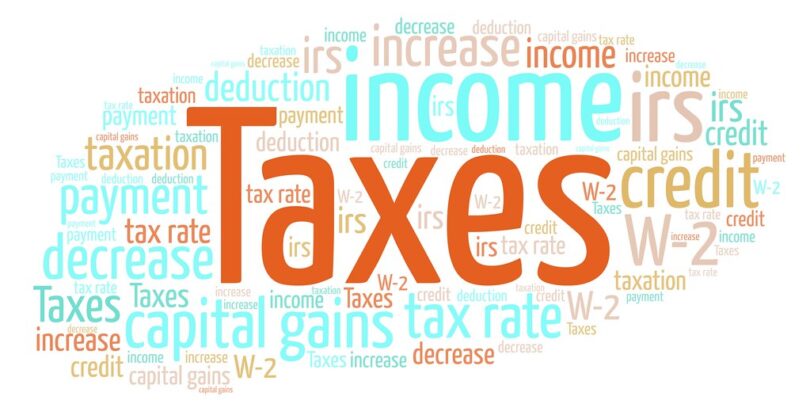Navigating the ever-changing, complex labyrinth that is tax law can seem like an impossible task. But demystifying taxation might seem less daunting with the right tips and techniques, all tailored to helping individuals and businesses understand and take control of their taxes. From the basics of filing taxes to complex structures, come take a journey through the winding pathways of taxation…
-Understanding the Basics of Taxation
What is Taxation?
Taxation is defined as the act of imposing a mandatory levy, usually in the form of money, on taxable income, transaction or wealth, in order to provide revenue for the government or to fund public programs. It can be voluntary or mandated by law, depending on the particular taxation system.
Types of Taxes
Taxes can be divided into two primary categories – direct taxes and indirect taxes.
- Direct taxes, such as income tax and wealth tax, are taxes imposed on individuals or businesses based on their income, profits, or assets. In most jurisdictions, direct taxes are non-refundable.
- Indirect taxes, such as sales tax and excise taxes, are taxes imposed on goods and services. The taxes are ultimately paid by those who buy the goods or services, and can be collected at the point of sale or remitted to the government at pre-determined intervals.
Taxation for Individuals
Individuals must pay taxes on their incomes, whether they are employees, independent contractors, or freelancers. Each jurisdiction sets different income tax rules for individuals, based on their income level and tax bracket. Additionally, individuals may have to pay additional taxes, including capital gains tax, sales tax, real estate transfer tax, and gift tax.
Taxation for Businesses
Businesses also must pay a variety of taxes, depending on the type of company, location, and size. Common taxes for businesses include corporate income tax, employer taxes such as Social Security and Medicare tax, and payroll tax. Depending on the type and size of a business, it may also be liable for other taxes such as sales tax, excise tax, and real estate transfer tax.
Taxpayer Obligations
Taxpayers must fulfill several obligations, including filing a tax return each year and remitting all taxes due by the assigned filing date. Taxpayers may also be required to keep accurate records of their income and expenses, as well as any other information related to the taxation of their income or businesses. In most cases, taxpayers are legally obligated to retain their tax documents for a certain period of time, which varies by jurisdiction.
-How Taxation Varies for Individuals and Businesses
It is no secret that navigating the intricacies of taxation can be a complex and seemingly insurmountable task, especially for those with limited experience in the area. Individuals and businesses alike face their own unique set of requirements and regulations with regard to taxation, and failure to comply could result in insurmountable losses and other unfavorable repercussions. But it doesn’t have to be that way – by understanding the tax law on the federal, state and local level for both individuals and businesses, one can easily demystify the complexities of taxation. Here, we’ll discuss:
- Individuals
- Businesses
Starting with income tax liabilities for individuals, the federal and most state governments impose a tax on the income of their residents. Tax rates and brackets for individuals vary depending on the taxable income, filing status and other circumstances established by the jurisdiction. These tax brackets are generally progressive, meaning the higher the taxable income, the higher the rate associated with it. Deductions and credits can be applied in order to reduce any possible tax liability, and individuals are also often allowed to engage in practices such as the use of tax credits and the itemization of certain deductions. Self-employment tax may also apply to some individuals, and the rates and limits associated with this tax are generally different from those associated with income tax.
On the other hand, businesses face a different set of income tax laws. Corporate tax is set at a flat rate that applies to all businesses who fall within the jurisdiction’s taxable income limits, regardless of size. On top of the corporate tax, businesses may be subject to additional taxes such as payroll taxes, sales taxes, value-added taxes, and capital gains taxes. Businesses may also be required to pay taxes on their property or profits, depending on the jurisdiction, and some may even be taxed for operating in certain locations. Finally, many businesses can take advantage of various deductions, credits, and other benefits in order to offset any potential losses due to taxes.
By understanding the various taxes and regulations for individuals and businesses, one can more easily traverse the maze of taxation by accurately calculating their tax liability in an effort to optimize their position. It is important to keep in mind that there are a variety of potential variables and exemptions at each level of taxation, so it is always beneficial to consult a tax advisor if one has any questions or concerns about their own situation. After all, being aware of the tax law can be a huge benefit that saves time, money, and potential headaches in the future.
-Navigating the Challenges of Complying with Tax Law
Navigating the intricacies of taxation is often complex, time-consuming, and daunting for businesses and individuals alike. Although federal, state, and local taxation laws vary, understanding the fundamentals of taxation helps to dramatically reduce the number of questions and challenges faced in business and personal taxation. Here are some key points to help demystify the complexities of taxation.
- Know Your Taxability: Under current law, most income is subject to taxation. It’s essential for individuals and businesses to recognize and understand different types of taxes, such as income, capital gains, and payroll taxes, as well as how taxable income is differentiated.
- Understand Your Taxation Status: Individuals and businesses have to understand their taxation status and types of deductions they are eligible for. Knowing the applicable deductions available on individual and business income, such as job expenses, state taxes, corporate charitable contributions, etc., helps to reduce taxable income and minimize any federal and state taxation liability.
- Unincorporated vs. Incorporated Businesses: Unincorporated businesses generally pay self-employment taxes (SE taxes) in addition to income taxes. Incorporated businesses can choose to pay corporate income tax on their profits or may opt to file their taxes as a pass-through entity. This could bring higher tax benefits and deductions.
- File Complete and Accurate Tax Returns: It’s important to submit accurate tax returns and include all required information. Many taxpayers fail to do so and may incur costly penalties. It’s also important to be aware of individual state tax forms, rules, and regulations on tax filing and payment.
- Stay Up to Date on Tax Law Changes: Tax laws change from year to year. It’s important to stay abreast of the latest federal, state, and local taxation laws to ensure compliance and avoid any penalties. For additional assistance, individuals and businesses can enlist the services of an experienced tax accountant.
Understanding the fundamentals of taxation laws for both individuals and businesses is a critical part of navigating the labyrinth of tax law. Knowing the rules and regulations, filing accurate returns, taking advantage of deductions, and staying up to date on changes in the taxation laws are all key points to consider to ensure compliance and reduce any potential liability.
-Making the Most of Tax Breaks and Tax Credits
Making the Most of Tax Breaks and Tax Credits
The realm of taxation is vast, dense, and ever-changing. Keeping abreast of the latest tax regulations is one of the most arduous tasks faced by individuals, business owners, and accountants alike. Whether you’re navigating tax law as a business owner or an employee, there are a few consistent rules that you should keep in mind.
Managing Tax Breaks and Credits
Firstly, considering the various tax credits and deductions available; these can help to lower your overall tax burden while also potentially opening up assets and opportunities that you can use to launch investments or improve your existing business.
Tax credits, compared to deductions, are based on the amount of taxes that you have paid. Rather than reducing your taxable income, they can lower the amount of tax that you are required to pay. Tax deductions on the other hand, reduces the amount of income that is taxable.
Research Investing Tax Benefits
Additionally, it is important to research the tax benefits associated with investments. Investing in the real estate market or in tech startups can lessen your overall tax burden, and investing in certain stocks specifically set up for this purpose can further lessen your tax liability for up to ten years.
Fully Utilizing Healthcare Tax Credits
Health care tax credits are one of the most beneficial types of tax credits for individuals and businesses. These credits are not only exempt from federal income taxes, but can also grant you a refund if the total cost of the credit exceeds the amount of taxes due.
Understanding Your Tax Bracket
Lastly, one of the most important aspects to think about is your tax bracket. As a business or individual, understanding your tax bracket and filing your taxes accordingly can help you navigate the labyrinth of tax law more effectively.
These tips are just the tip of the iceberg when it comes to demystifying taxation and making the most of the available tax breaks and credits. As the tax landscape evolves with the changing times, so too should your knowledge and understanding of the various tax laws available. Seek professional help to improve your understanding of the tax law and make the most of the available tax breaks and credits.
-Guidelines for Reporting and Record-Keeping
Organizing financial data and reporting it to the IRS:
Individuals and businesses need to organize their financial records in order to accurately report their income and expenses to the IRS. This ensures that the information provided to the IRS is correct and complete. The types of documentation and records necessary depend on the nature of the business and the kind of financial information that is being reported. For example, businesses that generate a significant amount of revenue need to maintain more detailed records than those generating a smaller amount. Additionally, businesses with complex transactions need to keep more records than those with simpler transactions.
Knowing the Tax Law:
Tax laws are constantly evolving and changing, which can make it difficult for individuals and businesses to stay abreast of the latest developments. To remain compliant with the current tax laws, individuals and businesses need to be diligent in researching the applicable regulations. They should consult with a professional tax advisor to ensure they are in compliance. Legal services or tax experts can advise and answer any questions related to reporting income and filing taxes.
Recordkeeping Necessities for Taxpayers:
Taxpayers need to keep accurate and complete records in order to accurately report income and expenses. The Internal Revenue Service (IRS) requires taxpayers to keep records for three (3) years for income tax returns, seven (7) years for returns related to bankruptcy, and two (2) years for payroll. Furthermore, taxpayers should keep any original documents, such as bills, receipts, cancelled checks, and credit card statements. Electronic records, including emails, are also considered valid records as long as they provide sufficient information to confirm the accuracy of the reported information.
-Tax Planning Strategies for Individuals and Businesses
Navigating the labyrinth of tax law can be one of the most taxing experiences for businesses and individuals. To help business owners and individuals effectively manage their taxes, there are several tax planning strategies. These strategies can help reduce and mitigate the burden of taxation.
Tax Payment Strategies
- Deferring Tax Payments: Deferring tax payments as far as possible can help improve cash flow for individuals and businesses. Deferring tax payments can also reduce the overall tax burden in the long run by decreasing taxable income.
- Tax Credit Strategies: Tax credits are a great way for businesses and individuals to reduce their taxes. Businesses may be eligible for credits or deductions for investments in research and development or certain training expenses. Additionally, individuals can use credits to reduce the amount of taxes they owe.
Tax Savings Strategies
- Retirement Savings: Taking advantage of retirement savings strategies such as 401(k)s and IRAs, can help reduce taxable income in the future. Retirement savings also provide a great way to build wealth over time.
- Charitable Contribution and Donations: Making charitable contributions and donations is a great way to reduce taxable income. Contributions to qualified organizations are often tax deductible, depending on certain conditions.
Tax Diversification Strategies
- Tax Deductible Investments and Expenses: Investing in tax deductible investments and expenses can help reduce a business or individual’s taxable income. Examples of tax deductible investments and expenses include rental real estate losses, passive losses, medical expenses, and qualified interest expenses.
- Tax Shelters: Utilizing tax shelters can help reduce taxable income for individuals and businesses. Tax shelters are legal structures that are designed to help companies and individuals reduce or avoid taxes. These shelters can be used for investments, retirement savings, and other activities.
Tax planning can be a complicated process, but businesses and individuals can use the strategies listed above to reduce their taxes and maximize their profits. Knowledge of tax laws and the various strategies available to individuals and businesses is the key to successful tax planning. By taking the time to understand the rules and regulations involved in taxation, individuals and businesses can minimize their tax burden and improve their financial position.
-Comparing Tax Rates and Taxpayer Liability Between States
Navigating the multitude of tax laws which exist on a national and state level can be a daunting task. Taxpayers need to understand not only the laws which govern the calculation of taxes due, but also the differences between the tax rates and liabilities imposed by individual states. To this end, it is essential to understand the discerning factors between taxation as imposed on the individual and corporations.
- Tax – On the Individual
- State tax rates for individuals can vary dramatically, with some states maintaining a flat income rate while others impose income taxes at progressive rates.
- Income taxes may also include surcharges, fees, or special taxes for specific income brackets.
- Tax - On Businesses
- States may also impose additional taxes, such as sales taxes, corporate income taxes, and unemployment taxes, on businesses.
- Business taxes may come in the form of corporate income taxes, minimum taxes, or even fees.
- Businesses should be aware of any specific industry taxes or credits which may be applicable to them and which can reduce corporation tax obligations.
Understanding the comparison of taxes and liabilities imposed between states enables taxpayers to effectively address their tax obligations and plan for their future. Armed with a comprehensive overview of taxation at the federal and state levels, taxpayers are better prepared to meet their financial goals.
-Learning to Balance Tax Planning with Investment Goals
For individuals and businesses, effective tax planning is key to successful investing. Navigating the labyrinth of tax law can be daunting and taking the time to understand the implications of each investment decision is critical. The following guide contains tips and advice to help you balance both your tax planning and your investment goals.
- Know Your Tax Planning Options: When it comes to tax planning, you may have the option to make certain deferral and compensation choices to lower your taxes. Figure out what your options are, how and when to take advantage of them, and what the resulting impact on your investments will be. Utilizing retirement plans and other tax saving vehicles can help you to manage your taxes throughout the life of your investment.
- Understand Tax Thresholds: When investing, there are certain thresholds that must be considered. Take the time to understand both the tax implications of exceeding these thresholds and the possible tax savings implications. This knowledge can help guide your investment decisions and help you remain in compliance with the law.
- Utilize Tax-Advantaged Investments: Tax-advantaged investments are a great way to plan for the future. By investing in options such as mutual funds and ETFs, you may be able to take advantage of potential tax savings while still diversifying your investments and accumulating savings for the future.
- Work With a Financial Planner: Hiring a financial planner to help you manage your investments and taxes can be an invaluable investment in your financial future. A financial planner can provide advice and guidance on the best strategies for planning for your future and staying in compliance with the law.
Tax planning can be a complex process, but it doesn’t have to be. By taking the time to understand the tax implications of your investments and utilizing tax-advantaged investments, you can navigate the labyrinth of tax law and make the most of your investments. Ultimately, as you continue to build your investment portfolio, stay mindful of the tax implications of the decisions you make.
-The Benefits of Tax Professional Assistance
Navigating the complex labyrinth of taxation by yourself or having the assistance of a tax professional is often a daunting task. With a myriad of rules, regulations, and taxes it is one of the most confusing and intricate areas of personal and business finance. However, there are undeniable benefits to having the assistance of a tax professional when filing one’s taxes.
- Expertise: Tax professionals possess years of knowledge and experience in the tax world, allowing them to provide their expertise and help with complicated and overwhelming taxes. It is their job to stay up to date on the latest tax laws and regulations, and they are highly educated in this field, giving them the ability to handle any tax query. They can offer tax advice and strategies to their clients that can help them save money and possibly get a better return.
- Accuracy: Tax professionals are trained to pay attention to details and make sure that all relevant information is included in the tax filing. This makes sure that nothing is missed when filing the taxes. They also have specially designed tax software that allows them to quickly and accurately complete your taxes.
- Time efficiency: Tax professionals are well-equipped to coordinate and manage all of the paperwork involved in filing tax returns. Their knowledge and experience also helps them to streamline the processes and make sure that everything is done appropriately and as quickly as possible.
- Peace of mind: Tax professionals can provide a sense of security by making sure that all of the paperwork is completed correctly and on time. It is their job to ensure that no mistakes are made or details are left out. This gives clients peace of mind knowing that their tax return is in good hands.
For individuals and businesses that are looking for assistance navigating the complex world of taxation, it is wise to consider the assistance of a tax professional. With their expertise, accuracy, time-efficiency, and peace of mind they provide, the benefits of having a tax professional to assist is undeniable.
There is no denying that tax law can be overwhelming and complex. But, by demystifying the taxation process and understanding the varied forms of taxes, taxes can become more navigable. The efforts include learning the different requirements for individuals and businesses as they file their taxes. With some patience and research, you will be on your way to confidently navigating the intricate world of tax law.








Leave a Comment